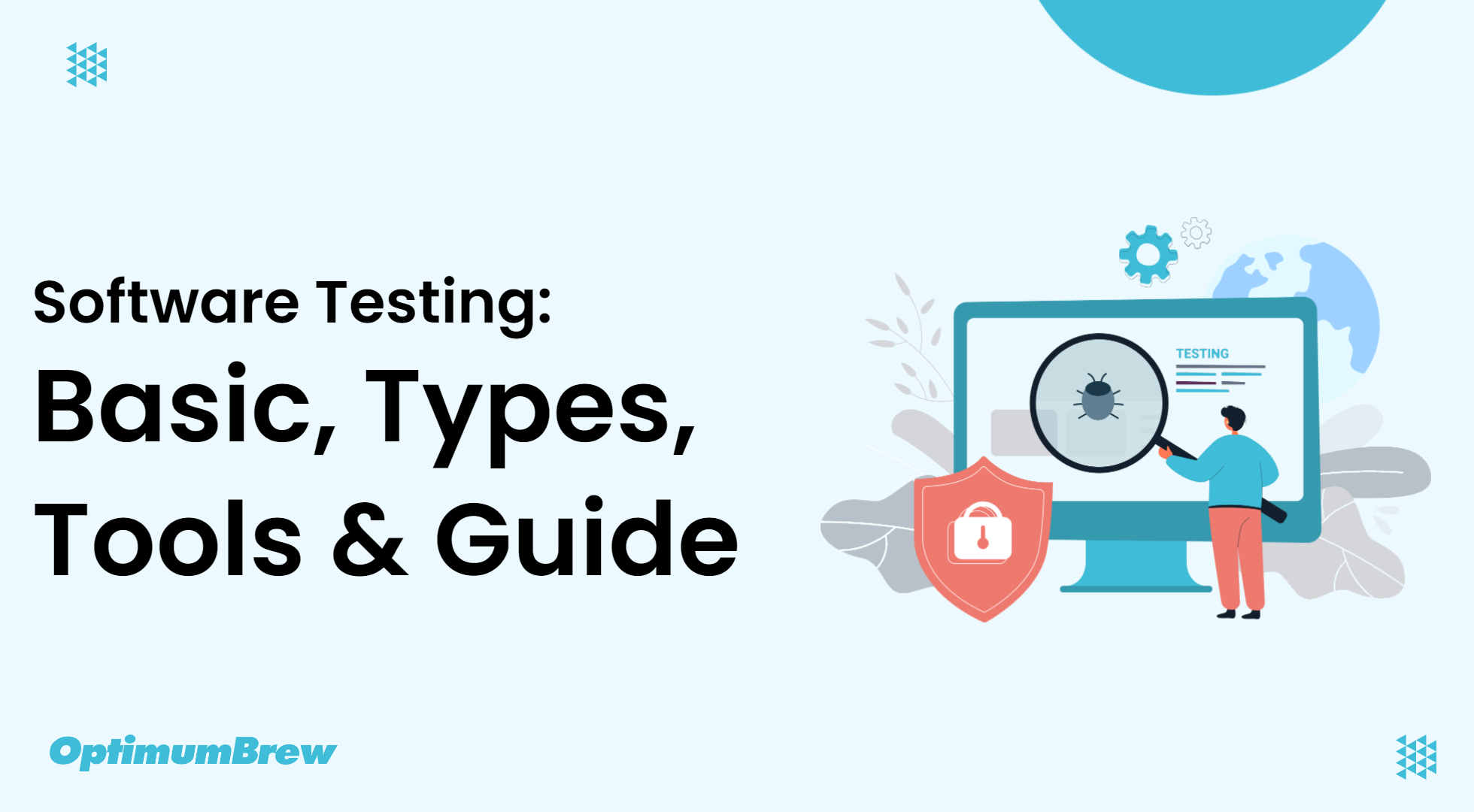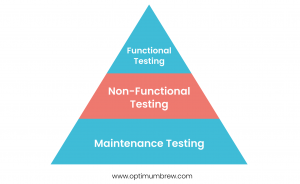Today’s world of technology is completely dominated by machines, and their behavior is controlled by the software powering it. Software testing provides the solution to all our worries about machines behaving the exact way we want them to.
This article on “What is Software Testing” will provide you with in-depth knowledge about how testing works in the following sequence :
- What is Software Testing?
- Why Software Testing is Important?
- What are the benefits of Software Testing?
- Types of Software Testing
- Principles of Software Testing
- Testing Strategies in Software Engineering
- Program Testing
- Which Testing Tools Should You Use?
What is Software Testing?
Software Testing is a process of evaluating the functionality of a software application to find any software bugs. It checks whether the developed software met the specified requirements and identifies any defect in the software in order to produce a quality product. It is basically executing a system in order to identify any gaps, errors, or missing requirements in contrary to the actual requirements.
It is also stated as the process of verifying and validating a software product. It checks whether the software product:
- Meets the business and technical requirements that guided its design and development
- Works as per the requirement
- Can be implemented with the same characteristics
Why Software Testing is Important?
Software Testing is Important because if there are any bugs or errors in the software, it can be identified early and can be solved before delivery of the software product. Properly tested software product ensures reliability, security and high performance which further results in time saving, cost effectiveness and customer satisfaction.
Software Testing is Important because we all make mistakes. Some of those mistakes are unimportant, but some of them are expensive or dangerous. We need to check everything and anything we produce because things can always go wrong – humans make mistakes all the time.
Since we assume that our work may have mistakes, hence we all need to check our own work. However some mistakes come from bad assumptions and blind spots, so we might make the same mistakes when we check our own work as we made when we did it. So we may not notice the flaws in what we have done.
Ideally, we should get someone else to check our work because another person is more likely to spot the flaws.
There are several reasons which clearly tells us as why Software Testing is important and what are the major things that we should consider while testing of any product or application.
Software testing is very important because of the following reasons:
- Software testing is really required to point out the defects and errors that were made during the development phases.
- Example: Programmers may make a mistake during the implementation of the software. There could be many reasons for this like lack of experience of the programmer, lack of knowledge of the programming language, insufficient experience in the domain, incorrect implementation of the algorithm due to complex logic or simply human error.
- It’s essential since it makes sure that the customer finds the organization reliable and their satisfaction in the application is maintained.
- If the customer does not find the testing organization reliable or is not satisfied with the quality of the deliverable, then they may switch to a competitor organization.
- Sometimes contracts may also include monetary penalties with respect to the timeline and quality of the product. In such cases, if proper software testing may also prevent monetary losses.
- It is very important to ensure the Quality of the product. Quality product delivered to the customers helps in gaining their confidence.
- As explained in the previous point, delivering good quality product on time builds the customers confidence in the team and the organization.
- Testing is necessary in order to provide the facilities to the customers like the delivery of high quality product or software application which requires lower maintenance cost and hence results into more accurate, consistent and reliable results.
- High quality product typically has fewer defects and requires lesser maintenance effort, which in turn means reduced costs.
- Testing is required for an effective performance of software application or product.
- It’s important to ensure that the application should not result into any failures because it can be very expensive in the future or in the later stages of the development.
- Proper testing ensures that bugs and issues are detected early in the life cycle of the product or application.
- If defects related to requirements or design are detected late in the life cycle, it can be very expensive to fix them since this might require redesign, re-implementation and retesting of the application.
- It’s required to stay in the business.
- Users are not inclined to use software that has bugs. They may not adopt a software if they are not happy with the stability of the application.
- In case of a product organization or startup which has only one product, poor quality of software may result in lack of adoption of the product and this may result in losses which the business may not recover from.
What are the benefits of Software Testing?
Here are the benefits of using software testing:
- Cost-Effective: Testing has many benefits and one of the most important ones is cost-effectiveness. Testing our project on time can save money in the long run. Software development consists of many stages and if bugs are caught in the earlier stages it costs much less to fix them.
- Security: It is the most vulnerable and sensitive benefit of software testing. User are looking for trusted products. It helps in removing problems and risks beforehand.
- Product quality: It is an essential requirement of any software product. In order to make your product vision come to life, it has to work as planned. It is important to follow the product requirements because it helps you get the required end results.
- Customer Satisfaction: The ultimate goal for a product owner is to give the best customer satisfaction. Software should be tested in order to bring the best user experience possible. Being the best product in this saturated market will help you gain trustworthy clients which will have great long-term effects.
Types of Software Testing
Here are the software testing types:
Typically Testing is classified into three categories.
- Functional Testing
- Non-Functional Testing or Performance Testing
- Maintenance (Regression and Maintenance)
| Testing Category | Types of Testing |
|---|---|
| Functional Testing |
|
| Non-Functional Testing |
|
| Maintenance |
|
This is not the complete list as there are more than 150 types of testing types and still adding. Also, note that not all testing types are applicable to all projects but depend on the nature & scope of the project.
Principles of Software Testing
Testing of software is exceptionally imaginative and an intellectual task for testers to perform. Testing of software or applications consist of some principles that play a significant role for a software tester while testing the project.
The Principles of Software Testing are as follows :
- Software testing can help in detecting bugs: Testing any software or project can help in revealing a few or some defects that may or may not be detected by developers. However, testing of software alone cannot confirm that your developed project or software is error free. Hence, it’s essential to devise test cases and find out as many defects as possible.
- Testing with effectiveness is impossible: Until your project or application under test has a straightforward structure having limited input, it won’t be likely or achievable to check and test all feasible sets of data, modules, and scenarios.
- Early testing: The earlier you will begin to test your project or software the better you will find to utilize your existing time.
- Defect in clustering: At the time of testing, you can observe that majority of the defects or bugs reported are because of a small number of modules inside your software or system.
- Software testing is context-dependent: Various methods, procedures, and kinds of testing are there which defines the type and characteristics of the application. For example, an application related to health device needs more testing and doctor based feedback than a game or small software.
- Error free or Bug-free software is a myth: Just because when a tester tested an application and didn’t detect any defects in that project, doesn’t indicate or imply that your software is ready for shipping.
Testing Strategies in Software Engineering
Here are important strategies in software engineering:
Unit Testing: This software testing basic approach is followed by the programmer to test the unit of the program. It helps developers to know whether the individual unit of the code is working properly or not.
Integration testing: It focuses on the construction and design of the software. You need to see that the integrated units are working without errors or not.
System testing: In this method, your software is compiled as a whole and then tested as a whole. This testing strategy checks the functionality, security, portability, amongst others.
Program Testing
Program Testing in software testing is a method of executing an actual software program with the aim of testing program behavior and finding errors. The software program is executed with test case data to analyse the program behavior or response to the test data. A good program testing is one which has high chances of finding bugs.
Which Software Testing Tools Should You Use?
- List of 21 Best Software Testing Tools
1. Selenium – Software Testing Tool
2. Coded UI Test – Software Testing Tool
3. TestRail – Automated & Manual QA Tester
4. IBM Rational Functional Tester – Automated Software Tool
5. Load Testing Tools
6. XRay
7. WebLOAD – QA Test Tool
8. JMeter – Automated Software Tester
9. Test Pad
10. Hewlett Packard Testing Tools – HP LoadRunner
11. HPE Unified Functional Testing (UFT)
12. JIRA Agile Testing Tool
13. PractiTest – Automated Software Tester
14. Watir – QA Test Tool
15. Eggplant Mobile Application Testing Tool
16. SeeTest Functional Testing Tool
17. SpiraTest – Software Testing Tools
18. Kobiton
19. Avo Assure
20. Lambda Testing Tool
21. Testim
Summary of Software Testing Basics:
- Define Software Testing: Software testing is defined as an activity to check whether the actual results match the expected results and to ensure that the software system is Defect free.
- Testing is important because software bugs could be expensive or even dangerous.
- The important reasons for using software testing are: cost-effective, security, product quality, and customer satisfaction.
- Typically Testing is classified into three categories functional testing, non-functional testing or performance testing, and maintenance.
- The important strategies in software engineering are: unit testing, integration testing, validation testing, and system testing.

















